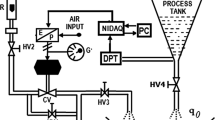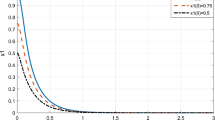Abstract
A self-learning fuzzy sliding-mode controller (SLFSMC) is proposed to control the temperature of a water bath. The SLFSMC system automatically tunes the rule bases using a rule modifier and the updating value of each rule is based on the fuzzy firing weight. In addition, this controller can be used for on-line learning in real-time control systems. In order to illustrate the performance of the proposed control method, it is compared with a proportional derivative-type fuzzy control (PDFC) and a gain-tuning fuzzy control (GTFC). These three algorithms are applied to a water bath temperature control and are simulated under the same conditions. The effect of load disturbance, the response to control, the tracking performance, and suitable sampling time are determined for each system. The simulation results show that the SLFSMC has superior characteristics, is more simple to use and has a fast response, so the SLFSMC performs better than the PDFC and GTFC.








Similar content being viewed by others
References
Astrom, K.J., Wittenmark, B.: Adaptive Control, 2nd edn. Pearson Education Taiwan, Taiwan (2006)
Tsoukalas, L.H., Uhrig, R.E., Zadeh, L.A.: Fuzzy and Neural Approaches in Engineering. Wiley, New York (1997)
Mudi, R.K., Pal, N.R.: A robust self-tuning scheme for PI-and PD-type fuzzy controllers. IEEE Trans. Fuzzy Syst. 7(1), 2–16 (1999)
Khalid, M., Omatu, S., Yusof, R.: Temperature regulation with neural networks and alternative control schemes. IEEE Trans. Neural Netw. 6(3), 572–582 (1995)
Li, C., Lee, C.Y.: Self-organizing neuro-fuzzy system for control of unknown plants. IEEE Trans. Fuzzy Syst. 11(1), 135–150 (2003)
Juang, C.F., Hsu, C.H.: Temperature control by chip-implemented adaptive recurrent fuzzy controller designed by evolutionary algorithm. IEEE Trans. Circuits Syst. I 52(11), 2376–2384 (2005)
Juang, C.F., Lu, C.M., Lo, C., Wang, C.Y.: Ant colony optimization algorithm for fuzzy controller design and its FPGA implementation. IEEE Trans. Ind. Electron. 55(3), 1453–1462 (2008)
Mary, P.M., Marimuthu, N.S.: Design of self-tuning fuzzy logic controller for the control of an unknown industrial process. IET Control Theory Appl. 3(4), 428–436 (2009)
Boubakir, A., Boudjema, F., Boubakir, C., Labiod, S.: A fuzzy sliding mode controller using nonlinear sliding surface applied to the coupled tanks system. Int. J. Fuzzy Syst. 10(2), 112–118 (2008)
Wang, C.H., Lin, C.H., Lee, B.K., Liu, C.N.J., Su, C.: Adaptive two-stage fuzzy temperature control for an electroheat system. Int. J. Fuzzy Syst. 11(1), 59–66 (2009)
Lin, C.M., Mon, Y.J., Li, M.C., Yeung, D.S.: Ecological system control by PDC-based fuzzy-sliding-mode controller. Int. J. Fuzzy Syst. 11(4), 314–320 (2009)
Nazir, M.B., Wang, S.: Optimized fuzzy sliding mode control to enhance chattering reduction for nonlinear electro-hydraulic servo system. Int. J. Fuzzy Syst. 12(4), 291–299 (2010)
Lin, C.M., Hsu, C.F.: Guidance law design by adaptive fuzzy sliding-mode control. J. Guid. Control Dyn. 25(2), 248–256 (2002)
Niknam, T., Khooban, M.H.: Fuzzy sliding mode control scheme for a class of nonlinear uncertain chaotic systems. IET Sci. Measur. Technol. 7(5), 249–255 (2013)
Lian, R.J.: Enhanced adaptive self-organizing fuzzy sliding-mode controller for active suspension systems. IEEE Trans. Ind. Electron. 60(3), 958–968 (2013)
Lian, R.J.: Adaptive self-organizing fuzzy sliding-mode radial basis-function neural-network controller for robotic systems. IEEE Trans. Ind. Electron. 61(3), 1493–1503 (2014)
Lin, C.M., Hsu, C.F., Mon, Y.J.: Self-organizing fuzzy learning CLOS guidance law design. IEEE Trans. Aerosp. Electron. Syst. 39(4), 1144–1151 (2003)
Acknowledgments
This work was supported partially by the National Science Council of the Republic of China under Grant NSC 98-2221-E-155-058-MY3
Author information
Authors and Affiliations
Corresponding author
Rights and permissions
About this article
Cite this article
Boldbaatar, EA., Lin, CM. Self-Learning Fuzzy Sliding-Mode Control for a Water Bath Temperature Control System. Int. J. Fuzzy Syst. 17, 31–38 (2015). https://doi.org/10.1007/s40815-015-0015-6
Received:
Revised:
Accepted:
Published:
Issue Date:
DOI: https://doi.org/10.1007/s40815-015-0015-6




